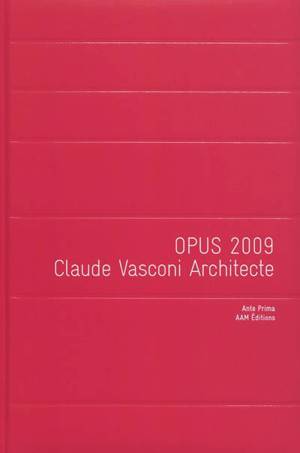
- Retrait gratuit dans votre magasin Club
- 7.000.000 titres dans notre catalogue
- Payer en toute sécurité
- Toujours un magasin près de chez vous
- Retrait gratuit dans votre magasin Club
- 7.000.0000 titres dans notre catalogue
- Payer en toute sécurité
- Toujours un magasin près de chez vous
Opus 2009
Claude Vasconi architecte
Christine Desmoulins, Christian HauvetteDescription
Fabriquer la ville et se couler dans la logique des lieux captivaient Claude Vasconi, architecte et ingénieur, Grand prix national d'architecture.
Sous l'éclat de sa peau rouge d'acier émaillé, le siège de Dexia Bil s'ancre dans le paysage des « Terres Rouges » luxembourgeoises. En écho à la silhouette des hauts fourneaux d'ArcelorMittal, son architecture puissante, technique et poétique fédère l'urbanisation des friches industrielles d'Esch-Belval.
Quittant ces terres historiques de la sidérurgie, Claude Vasconi s'en est allé, mais son oeuvre lui survit, comme l'affirme à juste titre Christian Hauvette, en conclusion de ce livre écrit par Christine Desmoulins.
Creating the town and working in harmony with local principles fascinated Claude Vasconi, architect and engineer, winner of the Grand Prix National d'Architecture.
Beneath the sparkle of its red enamelled steel skin, the Dexia Bil headquarters is rooted in the landscape of the « Terres Rouges » of Luxembourg. Mirroring the silhouette of the ArcelorMittal blast furnaces, its powerful, technological and poetic architecture brings together the urbanisation of the industrial wasteland of Esch-Belval.
Claude Vasconi has departed from this historic steelmaking land ; however, his work survives him, as Christian Hauvette justifiably states in conclusion to this book written by Christine Desmoulins.
Spécifications
Parties prenantes
- Auteur(s) :
- Editeur:
Contenu
- Nombre de pages :
- 145
- Langue:
- Français, Anglais
Caractéristiques
- EAN:
- 9782871432395
- Date de parution :
- 27-08-10
- Format:
- Livre broché
- Dimensions :
- 10 mm x 300 mm
- Poids :
- 990 g

Les avis
Nous publions uniquement les avis qui respectent les conditions requises. Consultez nos conditions pour les avis.






